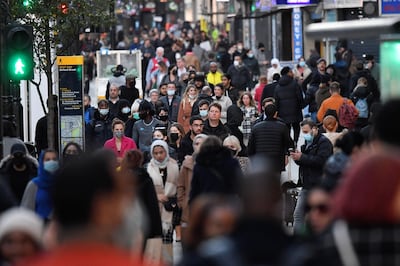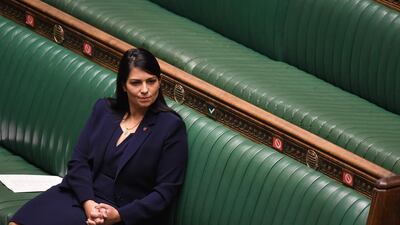This past fortnight, a man was charged by the UK authorities in connection to a terrorist plot to assassinate a lawyer at his office in London.
The man was clearly identified as an ideological extremist. If he had been a person of colour and a Muslim, it is likely that the incident would have received significant media attention, with British Prime Minister Boris Johnson perhaps even visiting the law firm in solidarity.
But the man was a white supremacist, who was attacking immigration lawyers, following increased rhetoric only days earlier against "activist lawyers" by UK Home Secretary Priti Patel.
The Guardian newspaper reported comments from someone with knowledge of the case as saying: "If you had a dubious politician abroad inciting hatred and then a UK terror incident was traced back to what this politician had said, then you can only imagine the measures that would be taken."
It is a sobering thought.
Indeed, when extremist Islamist terror attacks take place, the immediate response from politicians has often been to see where the discourse underpinning such violence has been coming from, and to problematise it accordingly.
This may be the case even if the discourse isn’t itself inciting violence. In this case, the situation is rather more complicated, partly because it is the UK Home Secretary herself who was using her privileged platform to criticise the lawyers.
None of this should be taken to mean that Ms Patel is responsible for the attempted attack. There are likely to be many reasons why the perpetrator opted to take this course of action.
Also, Ms Patel wasn’t calling for violence. Nonetheless, there remain two issues of importance: the first is the duty of those in positions of authority to engage in responsible rhetoric, knowing that their speech may have unintended consequences. The other is to recognise that white supremacists are a far greater threat than we are willing to concede.
Clearly, many do not take that threat seriously enough. Even after the attempted attack, Ms Patel continued to dabble in rhetoric against the legal profession – even after the lord chancellor and attorney general directly warned her against it.
The situation worsened. Not only did Ms Patel intensify her discourse but Mr Johnson declared that the justice system was facing obstacles from within “by lefty human rights lawyers”.
Considering the attempted terrorist attack against a lawyer only days before – for ideological reasons not so far disconnected from such oratory – this was irresponsible, to say the least.
But it is not simply in the UK where the threat from white supremacists is underestimated. According to a recent report by the Centre for Strategic and International Studies in Washington, white supremacists were behind most domestic terrorist attacks in the US this year.

Yet, when confronted with the issue of far-right wing groups during a presidential debate, US President Donald Trump refused to condemn a well-known far-right group and tried, instead, to refocus attention on left-wing groups. Indeed, Mr Trump directed the "Proud Boys" to "stand down and stand by".
In light of this, the International Crisis Group, a non-partisan global research group dedicated to the de-escalation of violence, issued a statement: “As US elections approach, extremist activity, the potential for contestation and President Donald Trump’s refusal to commit to transferring power peacefully raise concerns about possible violence. State and local officials should ensure that voting proceeds fairly, while foreign leaders should urge respect for democratic norms.”
The "extremist activity" noted here should give all of us pause.
It is not clear if the ICG has ever issued a statement like this. But the threat of the far-right remains deeply concerning, not just because the far-right exists, but because so much of its rhetoric is tolerated – even promoted – by portions of the mainstream.
When politicians mirror the discourse of extremists, they may not be directly responsible for the violence that extremists perpetrate, but they are certainly shirking their duties as leaders and fanning flames.
There are many possible, if unintended, consequences of such negligent behaviour, and we should not have to wait for disasters before calling out politicians to end their inflammatory rhetoric.
Dr H A Hellyer is a senior associate fellow at the Royal United Services Institute (RUSI) in London and the Carnegie Endowment for International Peace in Washington DC



